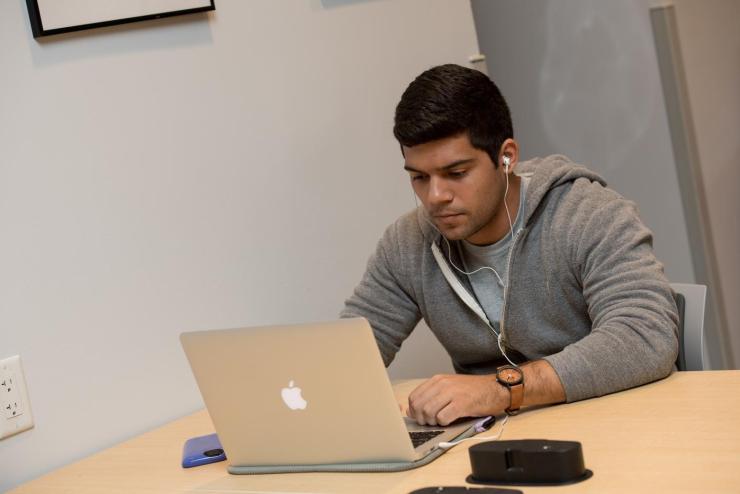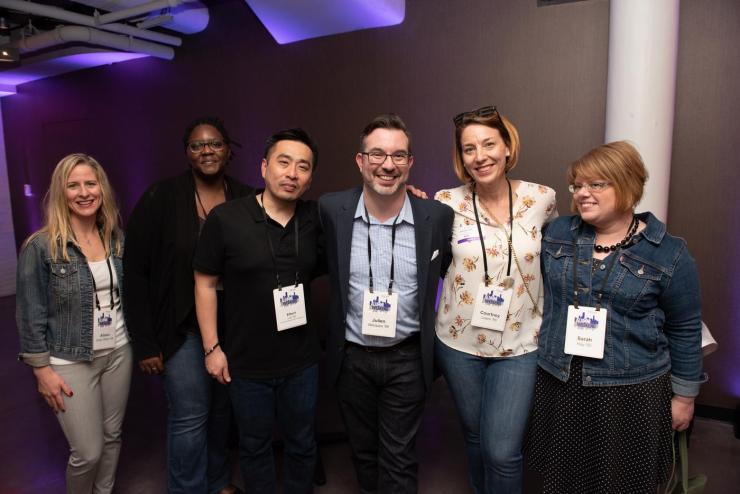What Is Networking?
Networking is having conversations with fellow professionals in your industry to build professional relationships, expose you to your industry, career field, or a person and it’s an opportunity to practice interviewing. Networking is not solely for access to job opportunities, but to embed yourself in an industry’s community throughout your whole career. It's essential to build these professional relationships while a student at Emerson and throughout your career. Want more individualized support with networking? Make an appointment with your career advisor on Handshake.
Why Is It Important?
- You learn about industry trends, cultures, and future opportunities.
- You can build your social network of professional peers, mentors, and experts.
- Eighty percent of jobs are found through contacts and referrals.
Tips for First-Time Networkers
- Have a goal in mind and be curious about the person you’re talking with.
- Reflect on past experiences, strengths, and skills gained.
- Write down your questions (see our Informational Interviewing Guide).
Other Helpful Resources
Career Development Center
- Attend the fall and spring internship fairs to network with local companies and organizations. (Even if you do not plan to do an internship the following semester, the fairs are a great place to network.)
- Attend employer information sessions to connect with industry professionals and find out about upcoming opportunities.
- See events on Handshake.
Your Personal Relationships
- Talk to your relatives, family friends, members of your communities (sports clubs, religious, shared interests, etc.), and members of organizations you belong to.
Professional Associations
- There are several for every type of career. Ask your contacts which associations they belong to and research other associations in the area. Use LinkedIn to research professional associations in your industry.
- Graduate students: You can also look at industry guides for lists of professional associations.
Tips for Making Contacts
- Research potential contacts who are in roles you find interesting.
- Look to personal contacts first (friends, family, colleagues, faculty, and acquaintances).
- Be genuine in your approach.
- Consider connections through your own personal interests.
- Email, LinkedIn, and Emerge are all good ways to establish contact, but after that, try to schedule an in-person meeting or phone or Zoom conversation. A more personal connection offers a better sense of who you are and helps you develop a strong rapport.
- Create a profile and connect with peers, alumni, and other professionals whom you know.
- Use LinkedIn as a way to build your online presence. Join and follow relevant groups for your industry or alumni groups, such as the Emerson College Alumni Association, to explore career paths of other Emersonians.
- Schedule an appointment to have your profile reviewed by a career counselor.
Networking Tips
- You have a more extensive network than you realize! Your professors, peers in clubs, classmates, high school peers, and various communities you're a part of are all examples of people in your network.
- Have a positive and curious attitude when you network.
- Be clear in identifying what you want and remember to say thank you.
- Prepare questions before a meeting or telephone conversation. Be succinct, courteous, and appreciative.
- Mingle with people you do not already know at meetings and events. Introduce yourself! (For introverts, we can coach you on this!)
- Share information, ideas, resources, and contacts with others. Networking is a two-way street and it’s about building a professional, long-lasting relationship.
- Limit the amount of assistance or information you seek from one person.
- Follow up on leads you have been given. You do not want to embarrass those who have made connections for you.
- Respect confidentiality. Trust is a vital part of networking.
- Networking should NOT be about asking for a job: it is to connect with professionals in your industry.
For guidance and more personalized questions, contact your career advisor.
Informational Interviewing
Career conversations are an important piece of learning about your industry and yourself. Here are tips for successfully conducting informational interviews.
Professional Communication
Effective communication skills are crucial for success at every step of your career path. Here are some reminders for writing professional emails.
Contacting Emerson Alumni
The Emerson alumni community is strong and growing! Learn how to connect with Emersonian industry professionals.



